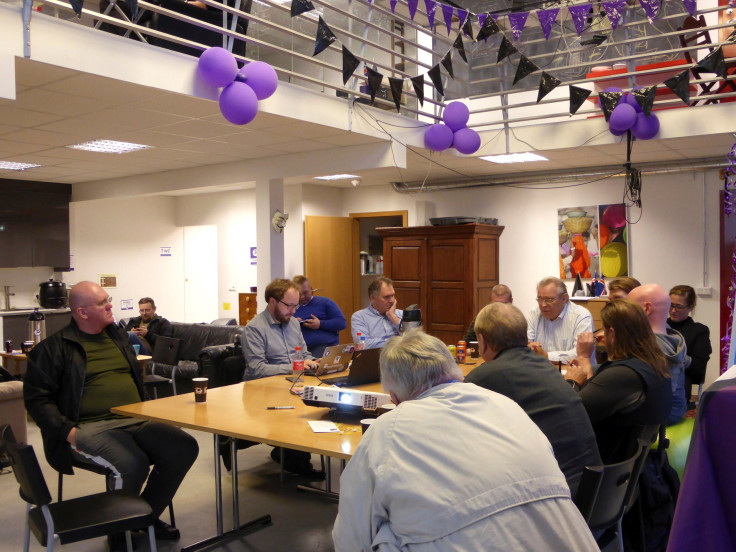What Is The Pirate Party? Icelandic Internet Warriors Set To Lead European Nation

A nation of Vikings could soon be ruled by pirates. The Icelandic Pirate Party is poised to take over Iceland's government this week with the help of anti-corruption voters. The movement was leading in the polls ahead of the country’s national elections Saturday, according to recent data.
The poll conducted between Oct. 14 and 15 suggests that over one in five voters will support the Icelandic Pirate Party in the coming elections. At 22.6 percent, the party leads the currently ruling, center-right Independence Party by a point and a half.
"To be a Pirate means to allow for the 21st century to enter the legal framework all citizens depend on. Our electoral success means the Icelandic people want change and trust the Pirates to lead by ethical example without corruption," Oktavía Jónsdóttir, who is running for the second seat of the South Constituency, told International Business Times.
Among the party’s core tenets are the promotion of civil rights, the right to privacy, information transparency, direct democracy and the right to self-determination. Followers, known officially as pirates, claim their party does not affiliate with traditional left or right-wing politics, but combines elements of both to focus on strengthening their nation’s democracy.
The Icelandic Pirate Party broke records in 2013 by securing 5.1 percent of the vote and placing three candidates in the national legislature, becoming the first pirate party, of which there are over 60 around the world, to place members in parliament. If the current figures hold, the Icelandic Pirate Party will have 15 seats after Saturday.
The Icelandic Pirate Party’s origins can be traced back to another pirate movement, which began in Sweden in 2003. The Pirate Bureau, known as Piratbyran, was created in 2003 by a group of Swedish activists in response to the establishment of the Swedish Anti-Piracy Bureau, a lobby group that aims to fight file-sharing and copyright infringement. The Pirate Bureau became famous for creating the international file-sharing network The Pirate Bay in 2003. Inspired by the movement, Swedish activist and tech entrepreneur Rickard Falkvinge began the Swedish Pirate Party in 2006 bring about internet copyright reform on a political level. Six years later, several prominent Icelandic internet activists, including the party’s current leader Birgitta Jonsdottir, formed the Icelandic Pirate Party.
“Individuals can and should change the world. It is the people’s moment, ordinary people being able to go into parliament to change laws that will actually give the other people more power. It’s a message of hope,” Jonsdottir told the Washington Post.

Economic and political troubles in Iceland have boosted the party’s popularity. The 2008 economic crisis deeply affected Iceland and created mistrust between its population and national leaders. Rather than bailing out its largest banks, Iceland allowed them to fail and even put its prime minister on trial for economic irresponsibility in 2012. That same year, the Icelandic Pirate Party began embracing the popular protests. By 2015, it was Iceland’s biggest political party.
World events this year have continued to bolster the party's momentum ahead of upcoming elections. In April, the release of the Panama Papers revealed that Prime Minister Sigmundur David Gunnlaugsson’s wife had created a company in the British Virgin Islands. Massive demonstrations accusing the leader of a conflict of interest led to his resignation and may have given the party extra fuel to compete in this year’s national elections.
“I think the Panama Papers, just like the Icelandic pirates, are part of a growing movement globally of people who are willing to see changes happening in the way government works. I think what we’re experiencing is societal change finally reacting to the technological revolution that we’ve had,” international party representative Sunna Aevarsdottir told TRT.
Party leaders tapped into their tech-savvy base Monday by taking to Reddit to answer user questions. Throughout the session, they answered questions on a wide range of topics, including whaling laws and Edward Snowden. While the discussion was lighthearted at times, Jonsdottir maintains that the movement is anything but a joke.
"We don't come across many people that assume that we are a joke, it might have been an issue when we were being formed, but it is not really something we experience now. We are a party that focuses on human rights in the digital era, with special focus on direct democracy," Jonsdottir wrote.
© Copyright IBTimes 2024. All rights reserved.






















